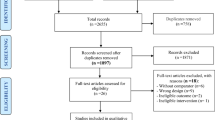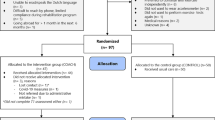Abstract
Purpose
In this qualitative study, we aimed to explore cancer survivors’ experiences with (1) return to work (RtW) and work performance, (2) a physical exercise program after treatment, and (3) the perceived link between physical exercise and work.
Methods
Semi-structured individual interviews were held with ten cancer survivors of working age who had been treated with chemotherapy and had afterwards completed a group-based supervised physical exercise program. The interviews were audio-taped and transcribed verbatim. MaxQDA was used for coding and analysis. A second assessor was involved in coding two of the interviews.
Results
Eight participants returned to work. Most said that they had suffered cognitive deficits that impaired their work performance. According to half of the participants, the support in RtW from their occupational physician had been insufficient. Overall, the majority of participants enjoyed the exercise program. The main perceived effects were “improved fitness” and “renewed energy.” Most participants thought that physical exercise had likely contributed to their ability to return to work, primarily by increasing energy levels. Some believed that physical exercise had enhanced their work performance by improving their ability to cope with demanding work. Some respondents found that a supportive work environment stimulated their continuation of physical exercise.
Conclusions
Cancer survivors experienced a positive influence of physical exercise on RtW and work performance and a positive influence of RtW on physical exercise. By stimulating and facilitating physical exercise during and after RtW, the time to lasting RtW may be shortened, work performance may be optimized, and sustained participation in physical exercise may be achieved.
Implications for Cancer Survivors
Stimulating and facilitating physical exercise before and during the process of RtW may enhance fitness and energy levels and may lower fatigue and cognitive symptoms during work. An integrated rehabilitation strategy combining physical exercise and adequate support in RtW may shorten the time to lasting RtW, improve work performance, and lead to sustained participation in physical exercise. Ultimately, this strategy may improve cancer survivors’ quality of life.
Similar content being viewed by others
References
Howlader N, Noone AM, Krapcho M, Neyman N, Aminou R, Waldron W, et al. SEER cancer statistics review 1975–2008. Bethesda: National Cancer Institute; 2011.
Aziz NM. Cancer survivorship research: challenge and opportunity. Journal of Nutrition. 2002;132(11 Suppl):3494S–503S.
de Boer AG, Verbeek JH, Spelten ER, Uitterhoeve AL, Ansink AC, de Reijke TM, et al. Work ability and return-to-work in cancer patients. British Journal of Cancer. 2008;98(8):1342–7.
Mehnert A, Koch U. Predictors of employment among cancer survivors after medical rehabilitation—a prospective study. Scand J Work Environ Health. 2013 (in press). Published ahead of print 2012 Mar 15. pii: 3291
Feuerstein M, Todd BL, Moskowitz MC, Bruns GL, Stoler MR, Nassif T, et al. Work in cancer survivors: a model for practice and research. Journal of Cancer Survivorship. 2010;4(4):415–37.
Chan F, da Silva CE, Copeland J, Jones R, Fraser RT. Workplace accommodations. In: Feuerstein M, editor. Work and cancer survivors. New York: Springer Science and Business Media; 2009. p. 233–54.
Sesto ME, Simmonds MJ. Fatigue, pain and physical function. In: Feuerstein M, editor. Work and cancer survivors. New York: Springer Science and Business Media; 2009. p. 123–46.
Silver JK, Gilchrist LS. Cancer rehabilitation with a focus on evidence-based outpatient physical and occupational therapy interventions. American Journal of Physical Medicine & Rehabilitation. 2011;90(5 Suppl 1):S5–S15.
de Boer AG, Taskila T, Tamminga SJ, Frings-Dresen MH, Feuerstein M, Verbeek JH. Interventions to enhance return-to-work for cancer patients. Cochrane Database Syst Rev. 2011;2:CD007569.
Kuoppala J, Lamminpaa A. Rehabilitation and work ability: a systematic literature review. Journal of Rehabilitation Medicine. 2008;40(10):796–804.
Thijs KM, de Boer AG, Vreugdenhil G, van de Wouw AJ, Houterman S, Schep G. Rehabilitation using high-intensity physical training and long-term return-to-work in cancer survivors. Journal of Occupational Rehabilitation. 2012;22(2):220–9.
Schmitz KH, Courneya KS, Matthews C, Demark-Wahnefried W, Galvao DA, Pinto BM, et al. American College of Sports Medicine roundtable on exercise guidelines for cancer survivors. Medicine and Science in Sports and Exercise. 2010;42(7):1409–26.
Horneber M, Fischer I, Dimeo F, Ruffer JU, Weis J. Cancer-related fatigue: epidemiology, pathogenesis, diagnosis, and treatment. Deutsches Ärzteblatt International. 2012;109(9):161–71.
O’Hagan FT, Coutu MF, Thomas SG, Mertens DJ. Work reintegration and cardiovascular disease: medical and rehabilitation influences. Journal of Occupational Rehabilitation. 2012;22(2):270–81.
Tong A, Sainsbury P, Craig J. Consolidated Criteria for Reporting Qualitative Research (COREQ): a 32-item checklist for interviews and focus groups. International Journal for Quality in Health Care. 2007;19(6):349–57.
de Backer IC, Vreugdenhil G, Nijziel MR, Kester AD, van Breda E, Schep G. Long-term follow-up after cancer rehabilitation using high-intensity resistance training: persistent improvement of physical performance and quality of life. British Journal of Cancer. 2008;99(1):30–6.
Benner P. The tradition and skill of interpretative phenomenology in studying health, illness, and caring practices. In: Benner P, editor. Interpretive phenomenology: embodiment, caring and ethics in health and illness. Thousand Oaks: Sage; 1994.
Britten N. Qualitative interviews in medical research. BMJ. 1995;311(6999):251–3.
Boeije H. Quality of research. analysis in qualitative research. 3rd ed. Amsterdam: Boom Onderwijs; 2005. p. 144–56.
Kennedy F, Haslam C, Munir F, Pryce J. Returning to work following cancer: a qualitative exploratory study into the experience of returning to work following cancer. Eur J Cancer Care (Engl). 2007;16(1):17–25.
Main DS, Nowels CT, Cavender TA, Etschmaier M, Steiner JF. A qualitative study of work and work return in cancer survivors. Psycho-Oncology. 2005;14(11):992–1004.
Nilsson M, Olsson M, Wennman-Larsen A, Petersson LM, Alexanderson K. Return to work after breast cancer: women’s experiences of encounters with different stakeholders. European Journal of Oncology Nursing. 2011;15(3):267–74.
Tamminga SJ, de Boer AG, Verbeek JH, Frings-Dresen MH. Breast cancer survivors’ views of factors that influence the return-to-work process—a qualitative study. Scandinavian Journal of Work, Environment & Health. 2012;38(2):144–54.
Asher A. Cognitive dysfunction among cancer survivors. American Journal of Physical Medicine & Rehabilitation. 2011;90(5 Suppl 1):S16–26.
Berger AM, Gerber LH, Mayer DK. Cancer-related fatigue: implications for breast cancer survivors. Cancer. 2012;118(8 Suppl):2261–9.
Vardy J, Wong K, Yi QL, Park A, Maruff P, Wagner L, et al. Assessing cognitive function in cancer patients. Supportive Care in Cancer. 2006;14(11):1111–8.
Verbeek J, Spelten E, Kammeijer M, Sprangers M. Return to work of cancer survivors: a prospective cohort study into the quality of rehabilitation by occupational physicians. Occupational and Environmental Medicine. 2003;60(5):352–7.
Adamsen L, Rasmussen JM, Pedersen LS. ‘Brothers in arms’: how men with cancer experience a sense of comradeship through group intervention which combines physical activity with information relay. Journal of Clinical Nursing. 2001;10(4):528–37.
Korstjens I, Mesters I, Gijsen B, van den Borne B. Cancer patients’ view on rehabilitation and quality of life: a programme audit. Eur Journal Cancer Care (Engl). 2008;17(3):290–7.
Spence RR, Heesch KC, Brown WJ. Colorectal cancer survivors’ exercise experiences and preferences: qualitative findings from an exercise rehabilitation programme immediately after chemotherapy. Eur Journal Cancer Care (Engl). 2011;20(2):257–66.
Speck RM, Courneya KS, Masse LC, Duval S, Schmitz KH. An update of controlled physical activity trials in cancer survivors: a systematic review and meta-analysis. Journal of Cancer Survivorship. 2010;4(2):87–100.
Taskila T, Lindbohm ML. Factors affecting cancer survivors’ employment and work ability. Acta Oncol. 2007;46(4):446–51.
World Health Organisation: International Agency for Research on Cancer. GLOBOCAN: cancer incidence and mortality worldwide in 2008. 2010. http://globocan.iarc.fr. Accessed 2012 March 18.
Acknowledgments
We are grateful to the Alpe d’Huzes Foundation/Dutch Cancer Society for funding this study. This study is part of the A-CaRe 2 Move program: www.a-care.org. The authors thank the A-CaRe 2 Move research collaborators. We would also like to thank all participants for their willingness to share their experiences and the staff of the sports medicine department of the Medical Center Haaglanden for their role in recruiting participants. We acknowledge Sietske Tamminga, PhD, for coding two interviews as a second assessor.
Conflict of interest
The authors declare that they have no conflict of interest.
Author information
Authors and Affiliations
Corresponding author
Rights and permissions
About this article
Cite this article
Groeneveld, I.F., de Boer, A.G.E.M. & Frings-Dresen, M.H.W. Physical exercise and return to work: cancer survivors’ experiences. J Cancer Surviv 7, 237–246 (2013). https://doi.org/10.1007/s11764-012-0264-4
Received:
Accepted:
Published:
Issue Date:
DOI: https://doi.org/10.1007/s11764-012-0264-4




